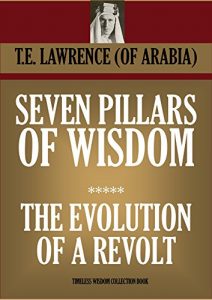This volume contains the extraordinary book "Seven Pillars of Wisdom", as well as an amazing article titled THE EVOLUTION OF A REVOLT in which T.E.Lawrence explains his arab campaigns.
The Seven Pillars of Wisdom is T.H. Lawrence's -better known as LAWRENCE OF ARABIA- major work, an account of his war experiences, edited by non other than GEORGE BERNARD SHAW. The story has inspired several movies, turning Lawrence of Arabia into a character of legend.
During the war, Lawrence fought alongside Arab irregular troops under the command of Emir Faisal, a son of Sherif Hussein of Mecca, in extended guerrilla operations against the armed forces of the Ottoman Empire (Turkey). Lawrence obtained assistance from the Royal Navy to turn back an Ottoman attack on Yanbu in December 1916. His major contribution to the revolt was convincing the Arab leaders (Faisal and Abdullah) to co-ordinate their actions in support of British strategy. He persuaded the Arabs not to make a frontal assault on the Ottoman stronghold in Medina but to allow the Turkish army to tie up troops in the city garrison.
The Arabs were then free to direct most of their attention to the Turks' weak point, the Hejaz railway that supplied the garrison. This vastly expanded the battlefield and tied up even more Ottoman troops, who were then forced to protect the railway and repair the constant damage. Lawrence developed a close relationship with Faisal, whose Arab Northern Army was to become the main beneficiary of British aid.
The Seven Pillars of Wisdom is T.H. Lawrence's -better known as LAWRENCE OF ARABIA- major work, an account of his war experiences, edited by non other than GEORGE BERNARD SHAW. The story has inspired several movies, turning Lawrence of Arabia into a character of legend.
During the war, Lawrence fought alongside Arab irregular troops under the command of Emir Faisal, a son of Sherif Hussein of Mecca, in extended guerrilla operations against the armed forces of the Ottoman Empire (Turkey). Lawrence obtained assistance from the Royal Navy to turn back an Ottoman attack on Yanbu in December 1916. His major contribution to the revolt was convincing the Arab leaders (Faisal and Abdullah) to co-ordinate their actions in support of British strategy. He persuaded the Arabs not to make a frontal assault on the Ottoman stronghold in Medina but to allow the Turkish army to tie up troops in the city garrison.
The Arabs were then free to direct most of their attention to the Turks' weak point, the Hejaz railway that supplied the garrison. This vastly expanded the battlefield and tied up even more Ottoman troops, who were then forced to protect the railway and repair the constant damage. Lawrence developed a close relationship with Faisal, whose Arab Northern Army was to become the main beneficiary of British aid.






